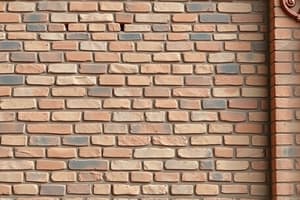Podcast
Questions and Answers
What is a characteristic of bricks that makes them a popular choice for building materials?
What is a characteristic of bricks that makes them a popular choice for building materials?
- They are highly resistant to load bearing compressive loads
- They are highly expensive and difficult to produce
- They offer a limited variety of colour and texture
- They offer a variety of colour, shape, and texture (correct)
What is the primary material used to make calcium silicate bricks?
What is the primary material used to make calcium silicate bricks?
- Iron and silica
- Sand and lime (correct)
- Clay and alumina
- Silica and manganese
What type of brick is used for decorative purposes and is more expensive than common brick?
What type of brick is used for decorative purposes and is more expensive than common brick?
- Clay brick
- Facing brick (correct)
- Engineering brick
- Common brick
What is the primary characteristic of engineering bricks?
What is the primary characteristic of engineering bricks?
What is the typical size of a concrete block?
What is the typical size of a concrete block?
What is the process by which calcium silicate bricks are hardened?
What is the process by which calcium silicate bricks are hardened?
What is the primary purpose of the insulation in a cavity wall?
What is the primary purpose of the insulation in a cavity wall?
What is the minimum width of the blocks typically used in construction?
What is the minimum width of the blocks typically used in construction?
What is the purpose of a plasticizer in mortar?
What is the purpose of a plasticizer in mortar?
What is the typical material used to manufacture blocks?
What is the typical material used to manufacture blocks?
Why is it important to use a well-graded clean sand in mortar?
Why is it important to use a well-graded clean sand in mortar?
What is the purpose of the stainless-steel wire wall tie?
What is the purpose of the stainless-steel wire wall tie?
What is the primary function of a damp-proof course (DPC) in a building?
What is the primary function of a damp-proof course (DPC) in a building?
What is the purpose of a vertical DPC in a wall structure?
What is the purpose of a vertical DPC in a wall structure?
What is the typical final coat used in internal plastering?
What is the typical final coat used in internal plastering?
What is a popular finish for external plastering?
What is a popular finish for external plastering?
What is the primary purpose of internal plastering?
What is the primary purpose of internal plastering?
Flashcards are hidden until you start studying
Study Notes
Bricks
- Bricks are one of the oldest manufactured materials, with a variety of colors, shapes, and textures.
- They are produced to withstand load-bearing compressive loads and must be fairly impervious, weather/frost resistant, and have an attractive appearance.
Types of Bricks
- Clay bricks: made from clay, silica, and alumina, with small quantities of lime, iron, and manganese, and baked in a kiln.
- Calcium silicate bricks: made from sand and lime, and hardened by exposure to steam at pressure.
- Common brick: generally used for building, can vary in quality, and has no decorative face.
- Facing brick: used for decorative appearance, more expensive than common brick.
- Engineering brick: very hard, dense, and smooth, with high load-bearing capacity and used for strength and durability.
Concrete Blocks
- Produced in a range of shapes and sizes, typically 450mm long by 150mm or 225mm high, and 100mm wide.
- Manufactured from sand, cement, and aggregate, and usually used where the surface will be covered with plaster.
Mortar for Bricks and Blocks
- Typically includes water, sand, cement, lime, or plasticizer.
- Well-graded clean sand helps produce a good workable mix of adequate strength.
- Ordinary Portland Cement is normally used for mortar.
- Plasticizer is an additive that can be mixed to make the mortar more workable.
Insulation
- Various types of insulation are available to place in a cavity wall to prevent heat loss in the building.
Damp-Proof Courses (DPC)
- Function: to prevent the passage of moisture or water through those parts of a structure in contact with the ground.
- Used to prevent downward passage of moisture or water through wall structures, such as window jambs.
Plaster
- Internal plaster: provides a smooth and level surface to walls and ceilings, and can improve fire resistance, acoustic, or thermal properties.
- External plaster: typically sand and cement, rubbed smooth, and painted with a masonry paint.
Studying That Suits You
Use AI to generate personalized quizzes and flashcards to suit your learning preferences.




